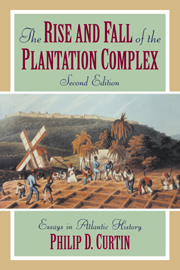Retrospect
Published online by Cambridge University Press: 05 June 2012
Summary
A collection of essays like this one can have no conclusion, but it may be worth trying to evaluate the plantation complex and its place in world history. It was clearly an important system of interrelated economic enterprises, with important ramifications for the European and North American economies – as well as for those on either side of the tropical Atlantic. It was the main impetus behind the Atlantic slave trade, the largest preindustrial population movement in the history of the world. The mature plantations of the Americas were the most specialized economies of their size yet to appear or to depend on goods carried over such great distances – inputs in food, labor, and supplies; outputs in tropical staples. It is obvious that the Europeans who ran the complex learned a great deal from the experience – in ocean shipping, tropical agriculture, and economic management at a distance. All this is a part of the background of the industrial age.
Still, it seems unlikely that the plantation complex was in any direct sense a cause, much less the cause, of the Industrial Revolution. Industrialization had its roots elsewhere, in technological change and patterns of investment in Europe itself. The complex was nevertheless a very important component of the overseas economy for France, the Netherlands, and Great Britain in the eighteenth century and into the nineteenth. In the mid-eighteenth century, Caribbean trade was about a third of French foreign and colonial trade by value, and the value of reexported sugar helped to pay for other French imports.
- Type
- Chapter
- Information
- The Rise and Fall of the Plantation ComplexEssays in Atlantic History, pp. 204 - 206Publisher: Cambridge University PressPrint publication year: 1998

